It’s not like Americans just sit at home watching their calendars and clocks, waiting for this lockdown to end. Things are still going on, the economy is still working. There are still solid consumer stocks to consider. The economy is just operating on a different level and companies that aren’t usually headline grabbers — like toilet paper makers — are now front and center as consumers refocus their buying priorities.
In an economy, there are always bull markets. Sometimes, they’re just harder to find.
But the fact is, having families locked down means groceries are a big deal, as well as consumer staples. And the kids are likely jumping from Tik Tok to videogames and back again.
But companies still run these parts of the economy and there are some great consumer stocks to buy.
I have used my Portfolio Grader screening tool to find seven of the best consumer stocks to buy right now. Each of these fit my Growth Investor criteria:
- Brown-Forman Class B (NYSE:BF.B)
- Procter & Gamble (NYSE:PG)
- Kellogg (NYSE:K)
- Hormel (NYSE:HRL)
- Activision Blizzard (NASDAQ:ATVI)
- Clorox (NYSE:CLX)
- Campbell Soup (NYSE:CPB)
These are pure plays on consumer demand, so this is their prime time. Let’s take a deeper look at what makes each of these consumer stocks stand out from the crowd.
Best Consumer Stocks to Buy: Brown-Forman (BF.B)
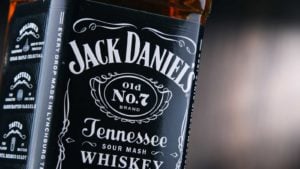
Brown-Forman started selling Old Forester whisky in 1870. Its primary innovation? Sealed bottles to show they hadn’t been tampered with before they got to the customers’ hands.
It has remained true to its Louisville, Kentucky roots over the 150 years. And the company remains in the hands of a Brown to this day.
But the company has added a few brands over the years. It owns eight whiskeys, including Jack Daniel’s and Woodford Reserve; three Scotch brands; three tequilas; one vodka; one liqueur; two wines and a gin.
With a $30 billion market cap, it’s a good-sized player in the space. And the brands it owns are mid- to top tier names that come with higher prices and higher margins. Also, recent studies have shown that younger generations are buying higher quality liquor and drinking less wine and beer.
Plus, this lockdown has seen spirits sales soar. A recent analysis from an industry source says off-premises spirits sales are up 27.4% since the lockdown began.
BF.B stock is up 25% in the past 12 months and it has a 1% dividend. This “sin” stock is worth a look.
Procter & Gamble (PG)
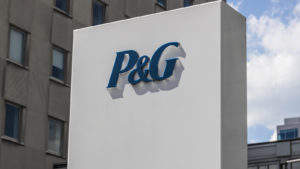
Procter & Gamble has been around since 1837 — Martin Van Buren won the presidency and the Panic of 1837 slammed the economy. The “panic” was a major depression that lasted until the mid-1840s.
That’s quite a time to start a business. But it will teach you to sell what people need at affordable prices if you want to survive. And PG stock has certainly survived over the years.
It now has a $280 billion market cap and the kind of economic “moat” around its business that even some of my Growth Investor stocks would envy. In fact, it is so big and pervasive that many of its products compete for market among themselves as much as with competitors.
This got the company in a bit of trouble a few years ago, when its portfolio was enormous. Fortunately, PG cleaned house and got rid of many of its unproductive brands and refocused its energies on its money makers. Specifically, a very popular brand right now — Charmin.
PG stock also delivers a very reliable dividend of 2.8%. It’s a rock-solid long-term stock, up 8.5% in the past 12 months.
Kellogg (K)
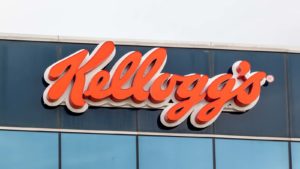
Kellogg is another old-school firm that has been in Battle Creek, Michigan since 1906. Not only does it have a prodigious line of cereal products, but it also houses the Keebler Elves cookies, Cheez-Its, Pringles and other snacks and cereals, including the Kashi brand.
These are the kinds of comfort foods that already fill the pantries of most houses. But when you’re all sitting around the house, these foods are even more prized. These are the go-to brands that generations have grown up on, and that means they’re a common denominator when putting together a shopping list.
There’s no doubt K stock has worthy competitors, but it has been doing well managing its brands and its competition for the past few years. It should be a beneficiary of this time in the economy and even as the economy reopens.
K stock is up 11% in the past year, and delivers a healthy 3.6% dividend.
Hormel (HRL)

Hormel is another company with roots that go back to Austin, Minnesota in 1891.
You should be surprised that many of the consumer stocks that have made this list are companies that have more than a century of experience under their belts.
As I always point out at Growth Investor, consumers drive this economy. They have for a long time; some of the most durable companies have been selling products that consumers want for decades, if not centuries — through good times and hard times.
This is why these companies are household names. And the best of these companies have been re-focused to compete in the 21st Century in a global economy.
HRL stock is a perfect example. While many pork processing plants have shut down HRL is still shipping meats. And before the novel coronavirus, China was in the grips of the African Swine Flu that wiped out 40% or more of its pigs. Hormel was there to augment their demand.
HRL stock is up almost 18% in the past year and has a 2% dividend.
Activision Blizzard (ATVI)

Activision Blizzard is one of the leading video game producers in the world. Its Activision brand releases games across all platforms, while its Blizzard brand has been involved with many popular games for PCs in particular. It’s also very involved in online gaming as well.
The Gen Z’s, millennials and Gen Xer’s have been the target audiences for these games in recent years. But there is growing data that shows a lot of people that put their controller down years ago, are now back online gaming with friends.
This is great news for the industry. And again, while much of the economy has stalled, gamers are driving significant demand in these products now.
ATVI stock is backed by a $56 billion market cap, which puts it heads and shoulders above the competition. That also means it’s more diversified and slightly more stable than some of the smaller players in the space that rely on one or two titles for much of their revenue.
ATVI stock is up 22% year to date and 56% in the past 12 months. And Activision in particular has been around since 1979. That means it has weathered plenty of storms, even when gaming was young and volatile.
Clorox (CLX)
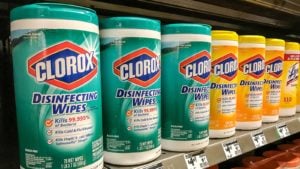
Clorox started in Oakland, California when Woodrow Wilson became president in 1913. It sold bleach.
Now, that might not seem very sexy, but it was good business. As a matter of fact, it didn’t have to introduce a second product until 1969. That in and of itself is pretty impressive.
Plus, it also means it was growing through WWI, the Great Depression and WWII and beyond, just selling bleach.
For a while it was acquired by PG, and even that worked in CLX stock’s favor until it unwound the deal and went independent again in ’69. That’s when it launched Clorox 2 color-safe bleach and acquired Liquid-Plumr.
Today, its cleaning products are flying off the shelves. And this “boring” stock is posting returns like it’s a tech stock. It’s up 37% in the past year; 31% year to date.
If its sales continue to be strong moving forward, then years from now, CLX stock will continue to deliver for its shareholders. And I’ve got even stronger buys where that came from.
Campbell Soup (CPB)
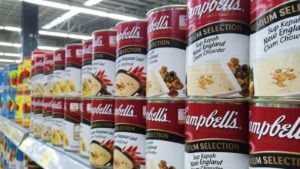
Campbell Soup was launched in Camden, New Jersey in 1869, four years after the end of the U.S. Civil War.
By 1895, it has launched its ready-to-eat tomato soup. And the rest is history.
But a few years ago, it looked like CPB stock may well be history. Its famous soups weren’t selling and the company was having trouble finding its footing in the grocery aisles.
Younger generations weren’t reaching for cans of cream of mushroom soup for green bean casseroles and its other standard brands weren’t doing much better. CPB stock was off 40% from its 2017 highs by last year.
But the company started to make a bigger push into the quality aspects of its brands and refine its product lines. And it has been working. CPB stock is back on a growth track and has regained almost all that loss.
In the past 12 months, Campbell is up nearly 30%, and with grocery sales up significantly, that will help improve its earnings even more. It also has a reliable 2.8% dividend.
Outside of a crisis, though, consumer staple stocks are tricky if you’re looking for growth.
That’s why I’m more focused on a completely different group, where my favorite stock offers both dividends and huge growth opportunities.
The AI Master Key
If artificial intelligence (AI) sounds futuristic, even far-fetched — well, keep in mind, you’re already using it every day. If you’ve ever used Alphabet’s (NASDAQ:GOOG, NASDAQ:GOOGL) Google Assistant or Apple’s (NASDAQ:AAPL) Siri … if you’ve had Netflix (NASDAQ:NFLX) recommend a movie or Zillow (NASDAQ:Z) recommend a house … even an email spam filter … then you’ve used artificial intelligence.
In this new world of AI everywhere, data becomes a hot commodity.
As scientists find even more applications for artificial intelligence — from hospitals to retail to self-driving cars — it’s incredible to imagine how much data will be involved.
To create AI programs in the first place, tech companies must collect vast amounts of data on human decisions. Data is what powers every AI system. As one AI researcher from the University of South Florida puts it, “data is the new oil.”
To cash in, you’ll want the company that makes the “brain” that all AI software needs to function, spot patterns and interpret data.
It’s known as the “Volta Chip” — and it’s what makes the AI revolution possible.
You don’t need to be an AI expert to take part. I’ll tell you everything you need to know, as well as my buy recommendation, in my special report for Growth Investor, The A.I. Master Key. The stock is still under my buy limit price — so you’ll want to sign up now. That way, you can get in while you can still do so cheaply.
Click here for a free briefing on this groundbreaking innovation.
Louis Navellier had an unconventional start, as a grad student who accidentally built a market-beating stock system — with returns rivaling even Warren Buffett. In his latest feat, Louis discovered the “Master Key” to profiting from the biggest tech revolution of this (or any) generation. Louis Navellier may hold some of the aforementioned securities in one or more of his newsletters.
